Raleigh Stride 2 eCargo Bike review - we had three families try and find the limits of this bike
Does the electric cargo box bike provide enough tricks to meet a variety of rider needs?
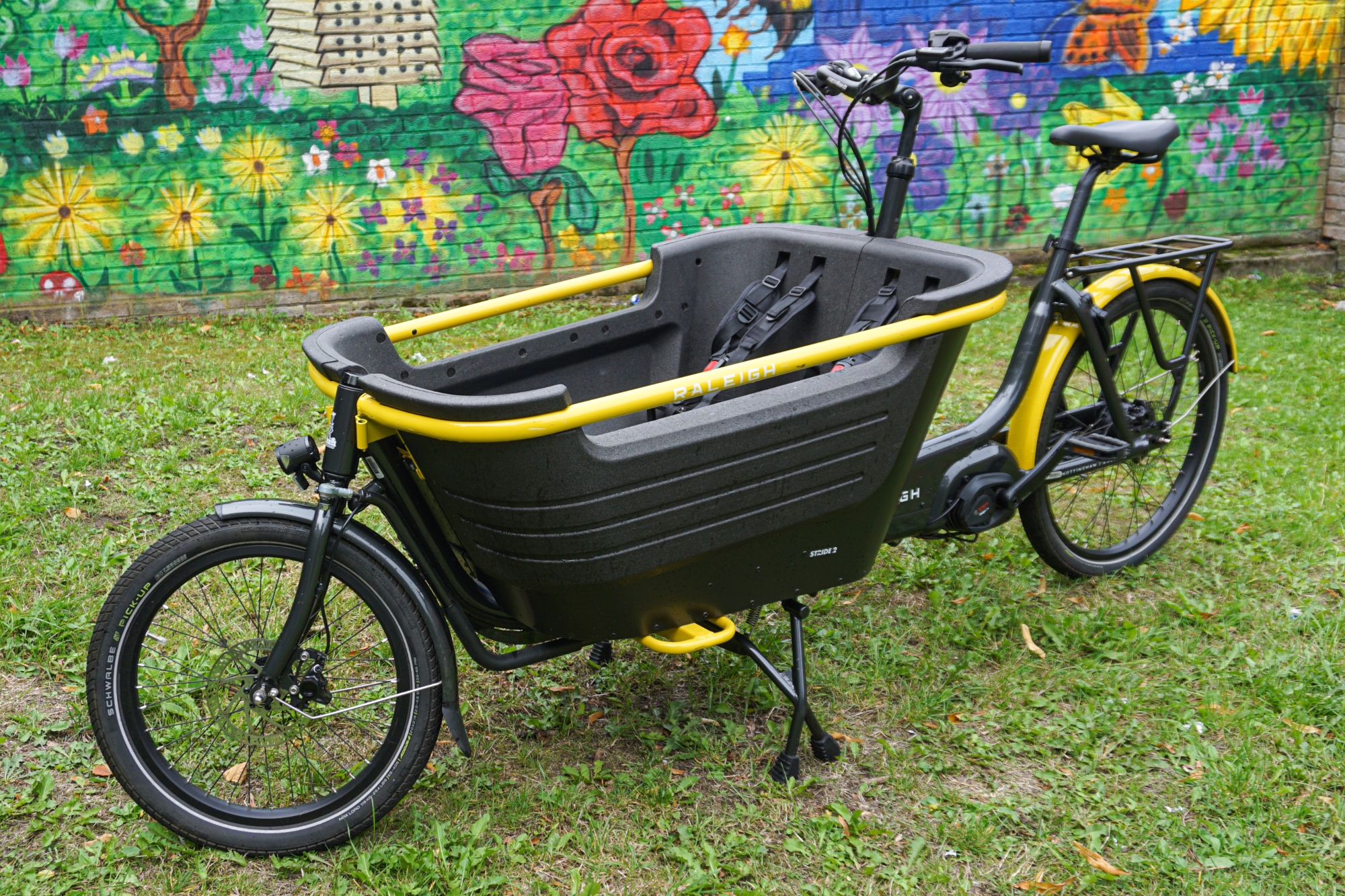
All riders have loved this bike: the kids loved this bike, the customers love this bike, and the people you ride past loved the bike. Wherever you ride, you will be followed by the phrase ‘oh, nice bike' (or 'that's sick' if it's the youth in the park) as you cycle past. The Raleigh Stride 2 has a lot to offer, and copes brilliantly with heavy loads and steep hills, and in terms of a box cargo design, there is very little you'd want to change. However, it is big, both in width and length meaning the day to day practicalities of owning and riding will need careful consideration to make sure it's the perfect addition to your household, as long as you are tall enough.
-
+
Great alternative to a car for many households or businesses
-
+
Huge cargo capacity
-
+
Powerful battery and motor
-
+
Excellent stopping power
-
+
Game changing step-less gears
-
-
Overall size for storage and riding on bike paths
-
-
No visual feedback from front wheel will take some getting used to
-
-
No ability to bespoke the internal tub with storage compartments
-
-
Hard for anyone below 5ft6" (170cm) to ride
You can trust Cycling Weekly.
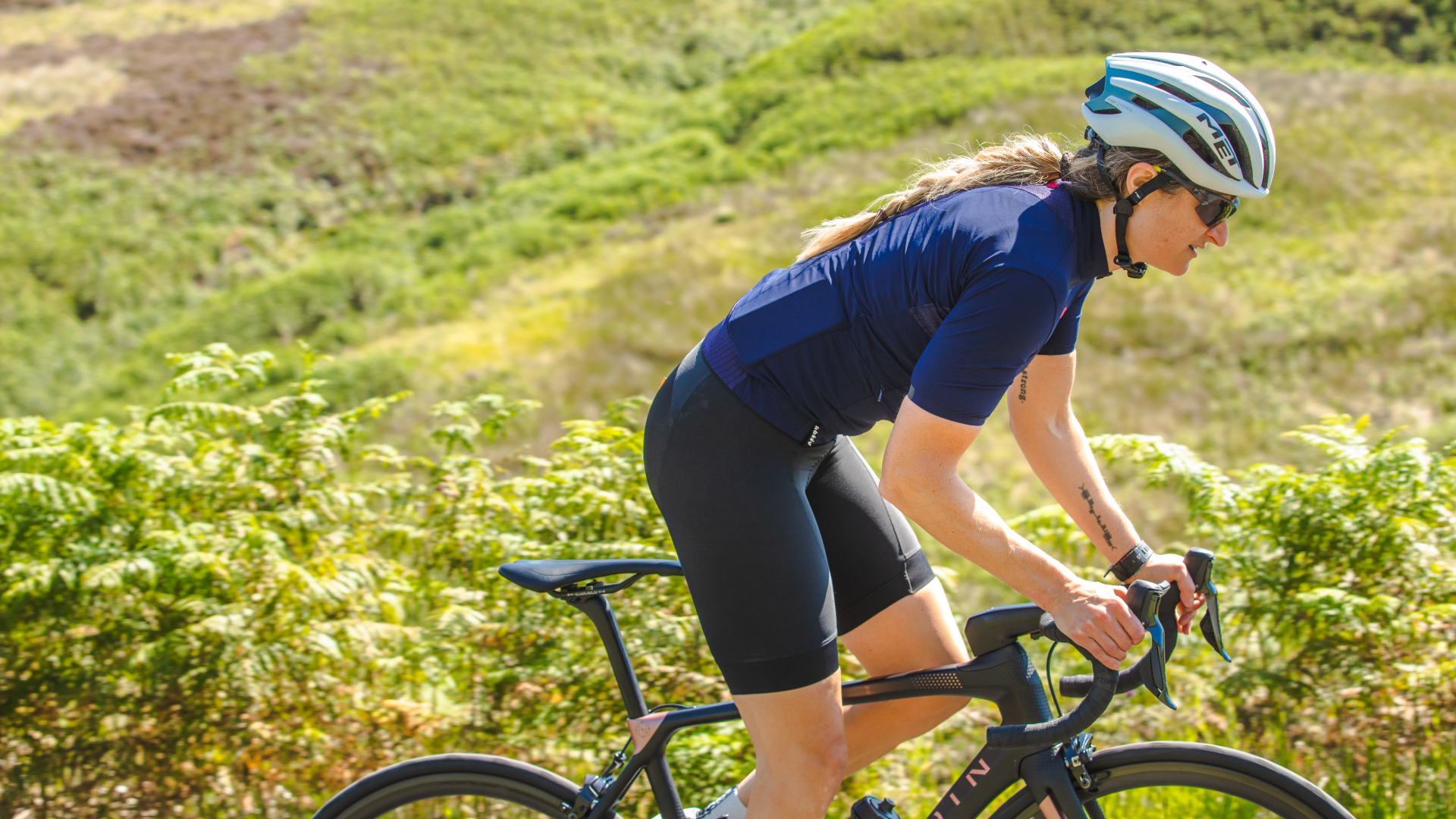
Here at Cycling Weekly we've been having a bit of a love affair of late. Actually, I'd say it's more than that – we're now positively going steady.
Our long term commitment to swapping our cars for the best electric cargo bikes is now way beyond the honeymoon period. In fact, the Raleigh Stride 2 eCargo bike has had not one, not two, but three riding families to put it through it paces.
Myles Warward, who lived and rides in York with two small children, Carl Peachey, who owns two refill shops (Lentils and Lather) in Greater Manchester, and myself and partner, who have an eight year old and an insanely hectic schedule.
But can one bike really meet the needs and requirements for three diverse cyclists and their families?
Raleigh Stride 2 eCargo Bike - Construction
The Raleigh Stride 2 eCargo bike is what's called a box bike design. The out front load is a departure from the long board e-cargo bikes of the Tern GSD and the Mycle that I've been riding for a similar duration.
This does mean that the bike's over all footprint is wider, due to quite literally having a 'box' out front, but also significantly longer too. It measures 2580mm in length, compared to the 1870mm of the Mycle and 1870mm of the Tern. It's a difference of 710mm, which does give you a super long wheelbase of over two and a half meters.
But then that is necessary once you factor in that 90 per cent of the load is out front – the rear and centre of the bike looks like a regular step through bike. It's after the handlebars where the transformation into 'box cargo bike' takes place with a bucket-like cargo area and the front wheel way out ahead.
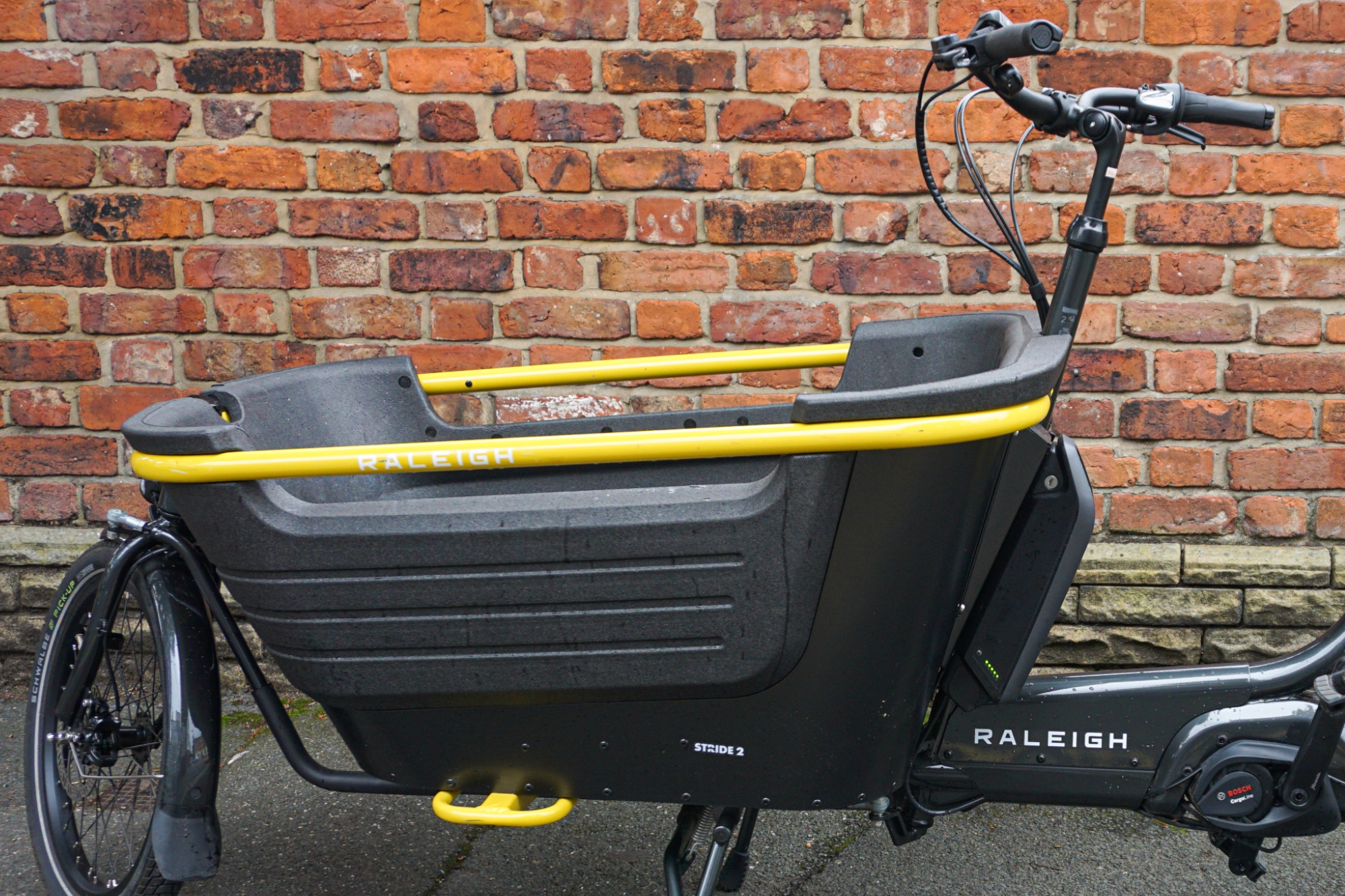
The front of the Raleigh Stride 2 showing the front tub and steering mechanism.
In between the handlebars and front wheel, there's a steering link which transfers the movement of the bars along what is effectively a long pole to the the front wheel.
A robust large polystyrene tub, which has a load capacity of 80kilos/ 176lbs, is located in the middle of the gap, which is ringed securely in place by framework. Out back is an additional rack, which can also be set up for carrying more cargo, be it a child seat, basket or panniers, which has a maximum weight of 25kilos/55lbs (although in theory this should be to be balanced out to a maximum of 80kg/176lbs across front and rear loads).
While this design allows for a huge capacity for cargo, and a rider weight of 100kilos/220lbs, it also means that the bike has to be strong enough to withstand these loads.
Making a bike from high tensile steel will certainly make it very strong and durable, but it certainly won't make it light. A total (claimed) bike weight of 60kilos/ 132lbs is testament to that fact.
To put that in context, it's double that of the Tern GSD and Mycle Cargo bikes.
As with all cargo bikes, the Raleigh Stride 2 eCargo bike comes in one size only. There is no official sizing, or geometry chart with which to measure up against. But taking measurements myself the minimum seat is 90cm from the floor, and maximum 110cm.
With a range of heights and leg lengths involved in testing, I'm yet to find a rider the bike won't fit. It's not going to be anything like a road bike position, which is why I haven't included a traditional saddle height (centre of crank to top of saddle) as it's tricky to set, especially if, like me, you want to be confident on planting a foot securely on the floor when coming to a stop.
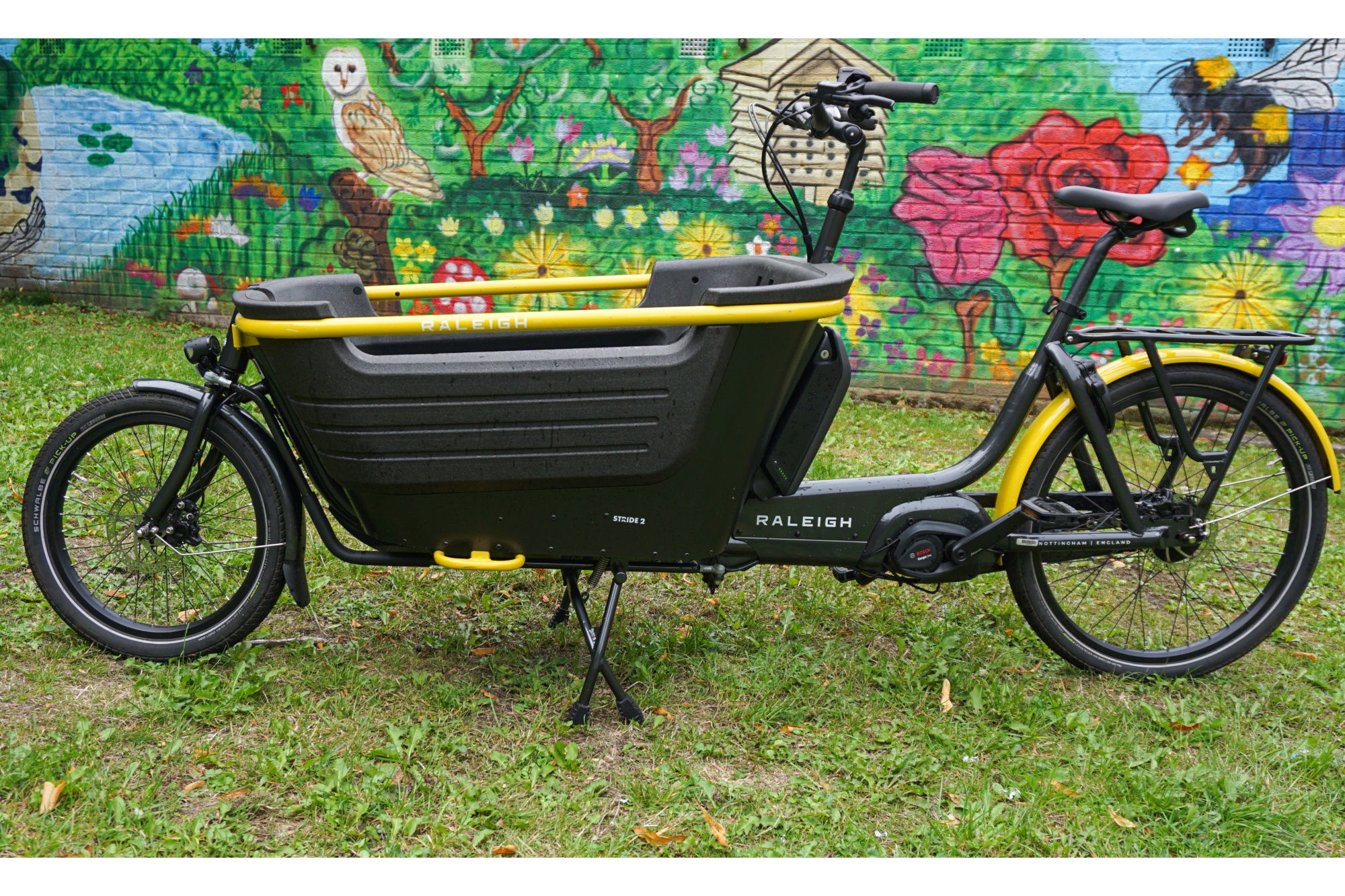
Stride 2 runs on what's called a mullet set up. Small 20" front wheel and a larger 26" rear wheel.
It's worth noting here that the Stride 2 runs on what's know as a mullet set up. The 20" front wheel is teamed with a 26" at the rear. It's the opposite of the mountain bike set up, which has gained (no pun intended) traction over the past few years, such as the race-proven Atherton AM.200M.
While in the mountain bike world you're looking for a fast rolling front with an agile and nimble rear, on a box cargo bike, you are looking for an agile front, with a faster ground covering rear to propel the bike along.
Raleigh Stride 2 eCargo Bike - Battery and Motor
As with any electric bike, the battery and motor capabilities are of equal importance to the frame and overall geometry.
The Stride 2 eCargo bike's weight means it requires a fair amount of muscle, and it's unsurprising to see that Raleigh has specced the Bosch Performance CX Cargo Line battery and motor, which is considered the industry gold standard. This has been specified in order to allow the bike to reach the top speeds of 25kph (around 15mph), the legal limit of most countries under their electric bike regulations.
It's the same set up that's found on the Tern GSD, although this time, you can't add an additional battery for a longer range.
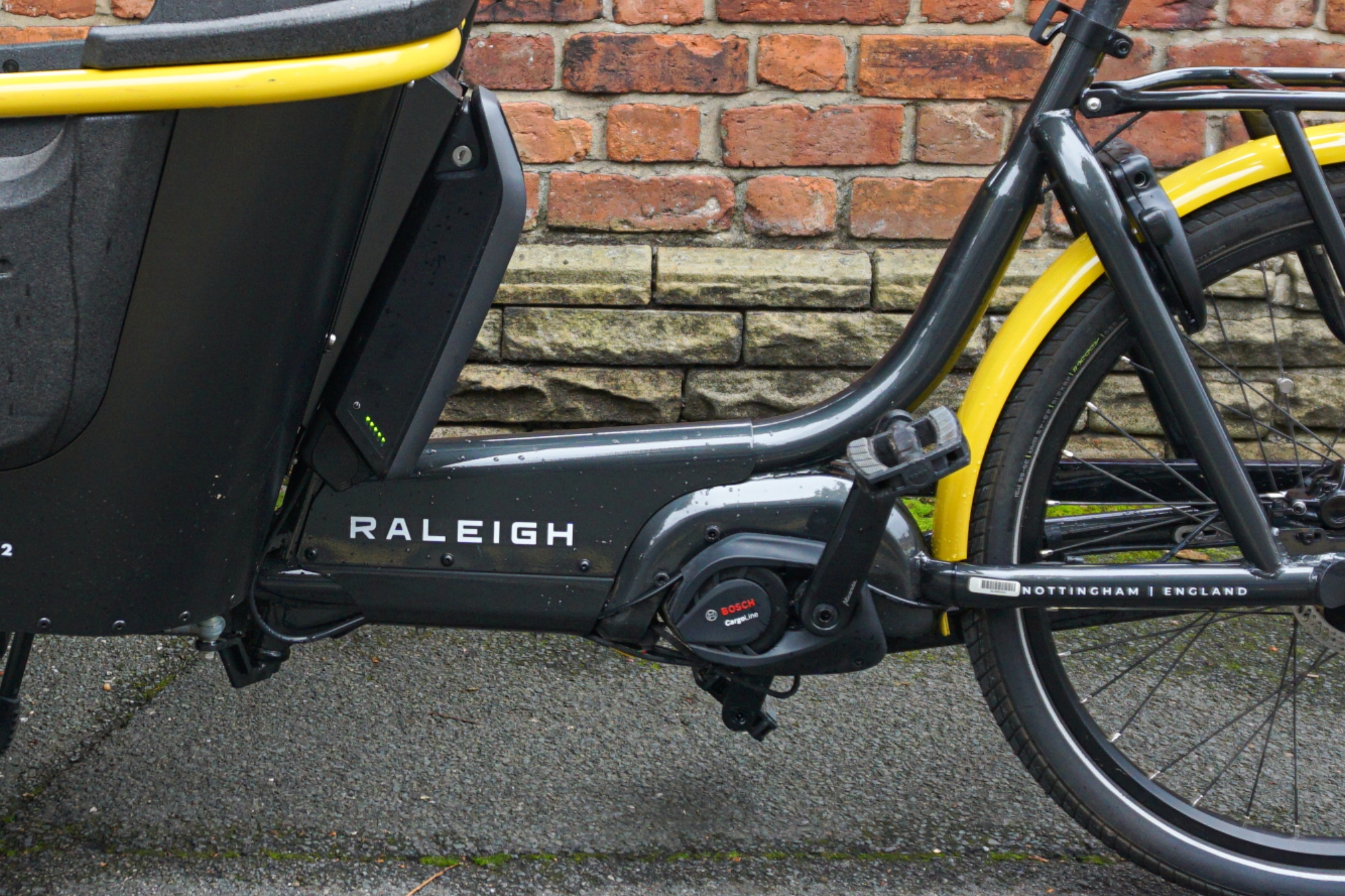
The Raleigh Stride 2 has specced the Bosch Performance CX Cargo Line battery and motor.
The 500wh battery, located on the steerer tube, has a suggested range of around 65km (40mi). However, like all electric bikes, this is a maximum, and will vary massively according to assist level, terrain, load weight and weather. We found that the Bosch ebike range assist calculator was much more accurate when assessing likely range.
The 250w motor is located in the bottom bracket and, according to Bosch, delivers four times your own pedal power in terms of support; although this does depend on which of the four pedal-assist settings you select. The lowest Eco setting offers just an additional 60 per cent, but will mean you'll get more range from the battery.
It also delivers 85 Newton Meters (Nm) of torque, which we previously calculated to providing an additional 20Nm more than the top-end electric mountain bikes. Considering some of the terrain they are expected to tackle it gives you an idea as to the amount of hauling power this bike comes equipped with.
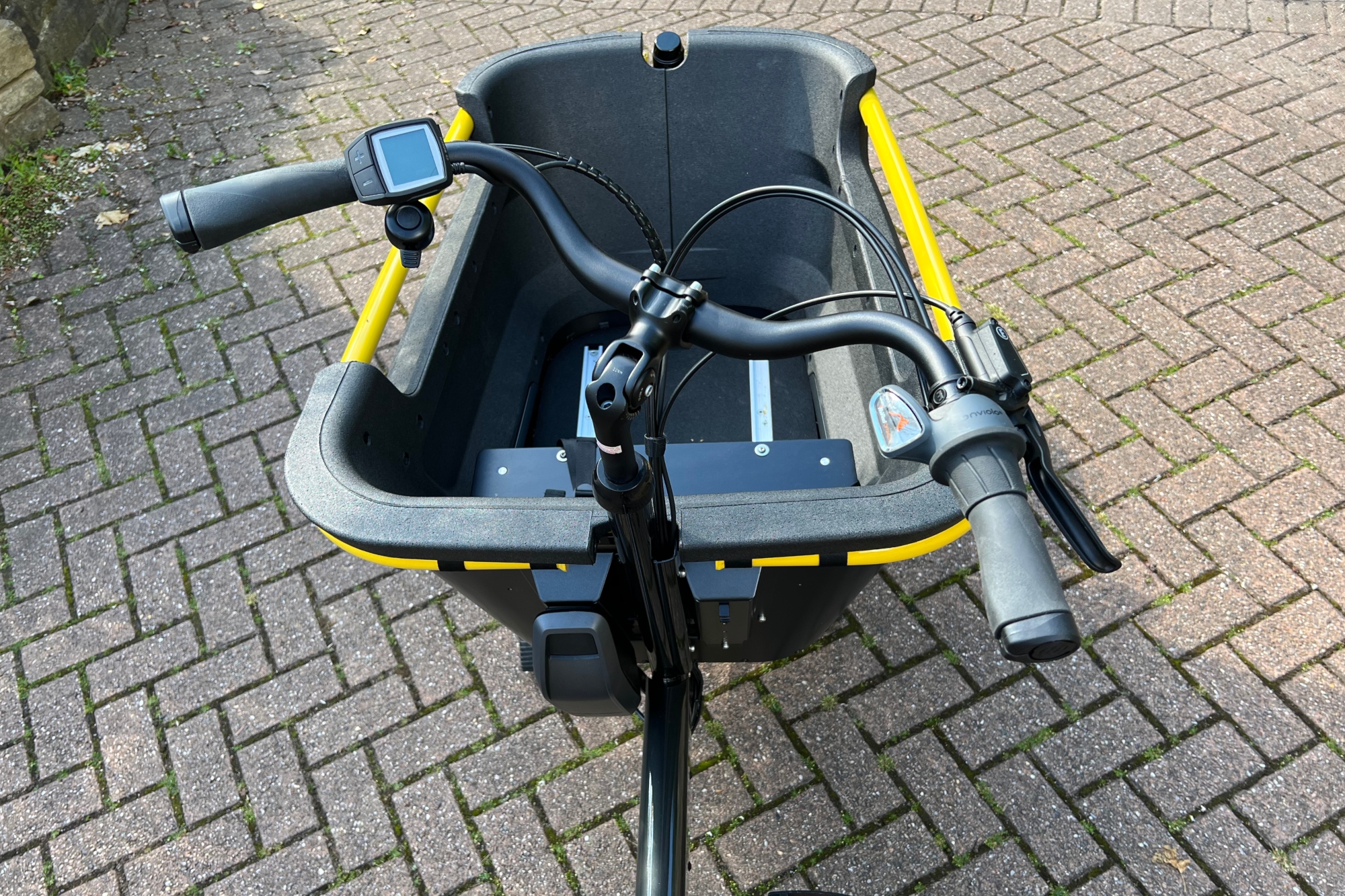
The Raleigh Stride 2 comes with the excellent Enviolo NuVinci Stepless shifter.
Raleigh Stride 2 eCargo Bike - Drive train and brakes
Another area of an electric bike that's vitally important is its controls.
In terms of stopping power, the Raleigh Stride 2 eCargo bike uses hydraulic Magura MT-C disc brakes, with 160mm rotors front and rear.
The real excitement however is around the Enviolo NuVinci Stepless Shifter. This is effectively stepless gearing, which does away with traditional gear ratios, meaning that you'll always find the perfect cadence. This also means that you can change gear whilst stationary, a great addition for any electric bike, and can be found on the Canyon Precede:ON CF 9 ST. It's an especially great addition for a cargo bike, when setting off from dead stops often requires a far smaller gear than the one you came to a stand-still in.
Raleigh Stride 2 eCargo Bike - Cargo set up
The standard set up for the Raleigh Stride 2 eCargo bike contains a wooden bench seat and two three-point belts. If you are transporting children, it is really important to cross check ages against the carrying recommendations on the Raleigh website and manual, as for younger children, specific child seats will be necessary. For older children, it may be just a case of purchasing a cushion for passenger comfort.
Cargo set up is a really personal decision however, and as with other brands of electric cargo bikes, there are multiple after market accessories available to purchase. The most practical being a simple box cover, while the more extravagant being a passenger rain cover.
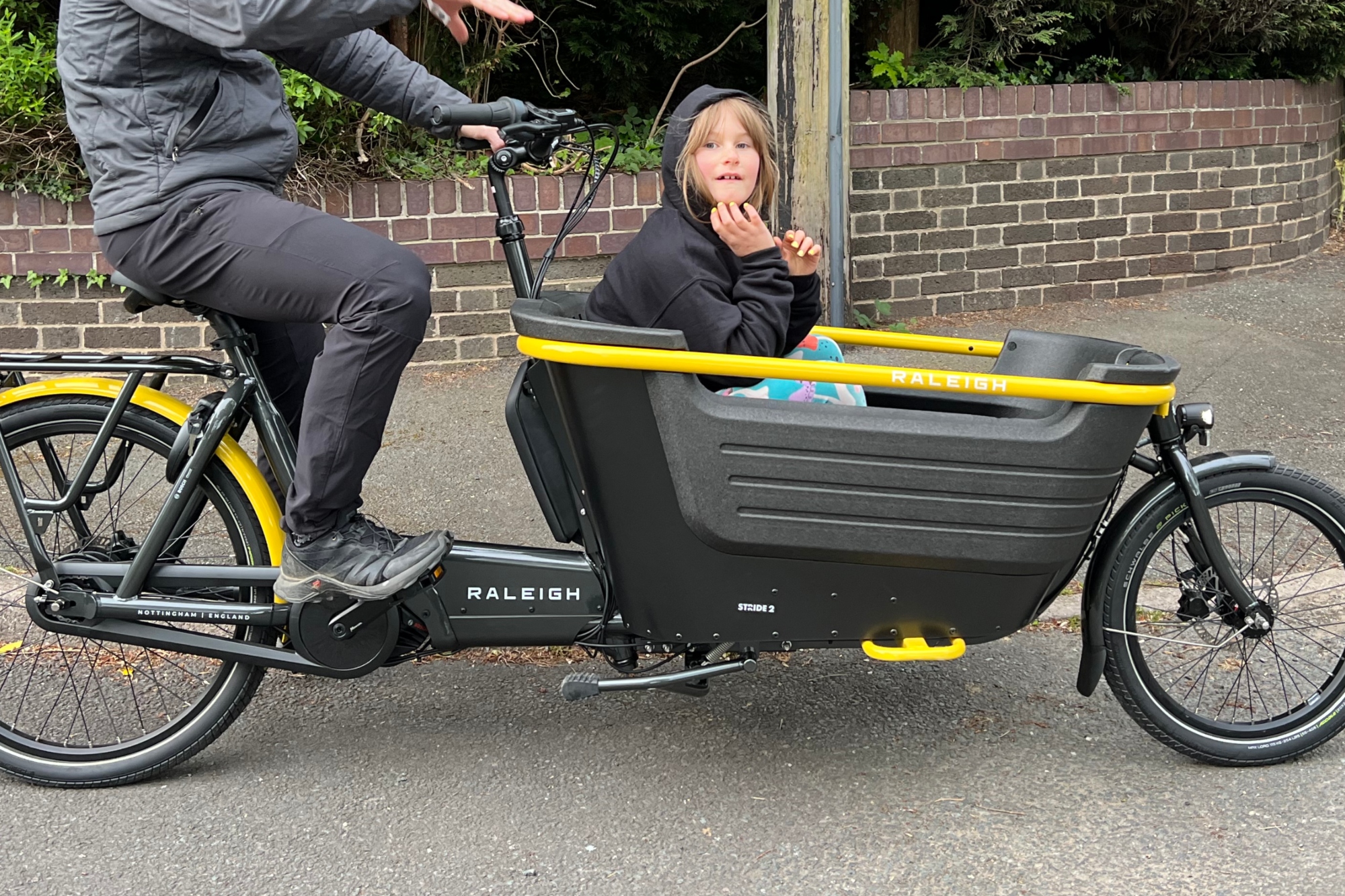
There was lots of space for a child passenger in the Raleigh Stride e-cargo bike.
Raleigh Stride 2 eCargo Bike - The ride
As mentioned above, the Raleigh Stride 2 eCargo bike has been given a thorough shake down by three diverse families. Although we had more than one test bike, collectively between us we've covered in the region of 800km/ 500miles.
It's a fair old distance for one model of bike during a review period, and evidence of just how adaptable the bike is, from dropping kids off at school to delivering groceries to canal boats along the canal path.
Myles found that loading his two kids in and out was easy with the super secure three-point harness, which can be tightened and loosened to suit passenger needs. My eight year old also found the little side made it easy to climb up and into the bucket, with the railings giving something to hang on to, and the dual kick stand keeping the front stable enough to climb in from one side.
The box style design does mean that you can see whatever you have in the loading tub. It offers the perk of being able to keep an eye on your load of either people or groceries without being too distracted by having to turn round.
As someone who has grown to expect the unexpected from my eight year old riding shotgun on a long board cargo bike (where she sits behind me), this does mean keeping an eye on her antics is easier. However this doesn't mean that the no hands or feet outside the cart aren't an issue. With the Raleigh Stride they were just undertaken in plain sight, causing occasionally more riding anxiety, whereas before I had probably been blissfully unaware.
When it came to carrying groceries, Carl reported the cargo load was much more compliant and happy to sit still securely in place.
The swiftness and ease of loading and un-loading, thanks to the open tub design, was welcomed by all users. The aforementioned dual-sided kickstand made the bike feel stable with a child or shopping left in compared to the long board design e-cargo bike.
The downside for all of us was inclement weather, and the challenge of the tub design. Of course there are a couple of cover options, for cargo if not rider, which realistically would need to be invested in if you were intending on year round riding.
For passenger cargo, there is always the option of investing in a good set of waterproofs, but bags and the like will fall foul of a heavy downpour, with the bucket filling quicker than it can drain.
This is also where the only real gripe is: there are no storage compartments, or elasticated nets on the inside of the cargo bay to help stow things like kids’ coats and water bottles, or have somewhere to attach a dogs lead to. Even just little eyelets would be enough to allow some bespoke setup.
For Carl, mostly transporting groceries, it might be a better option to select the Pro Cargo bike, which is exactly the same chassis, but with a lightweight composite fibreglass box, with a lower power specced Yamaha motor and battery system. While this does give a dry and covered space for transporting goods, it does limit the versatility for anything else.
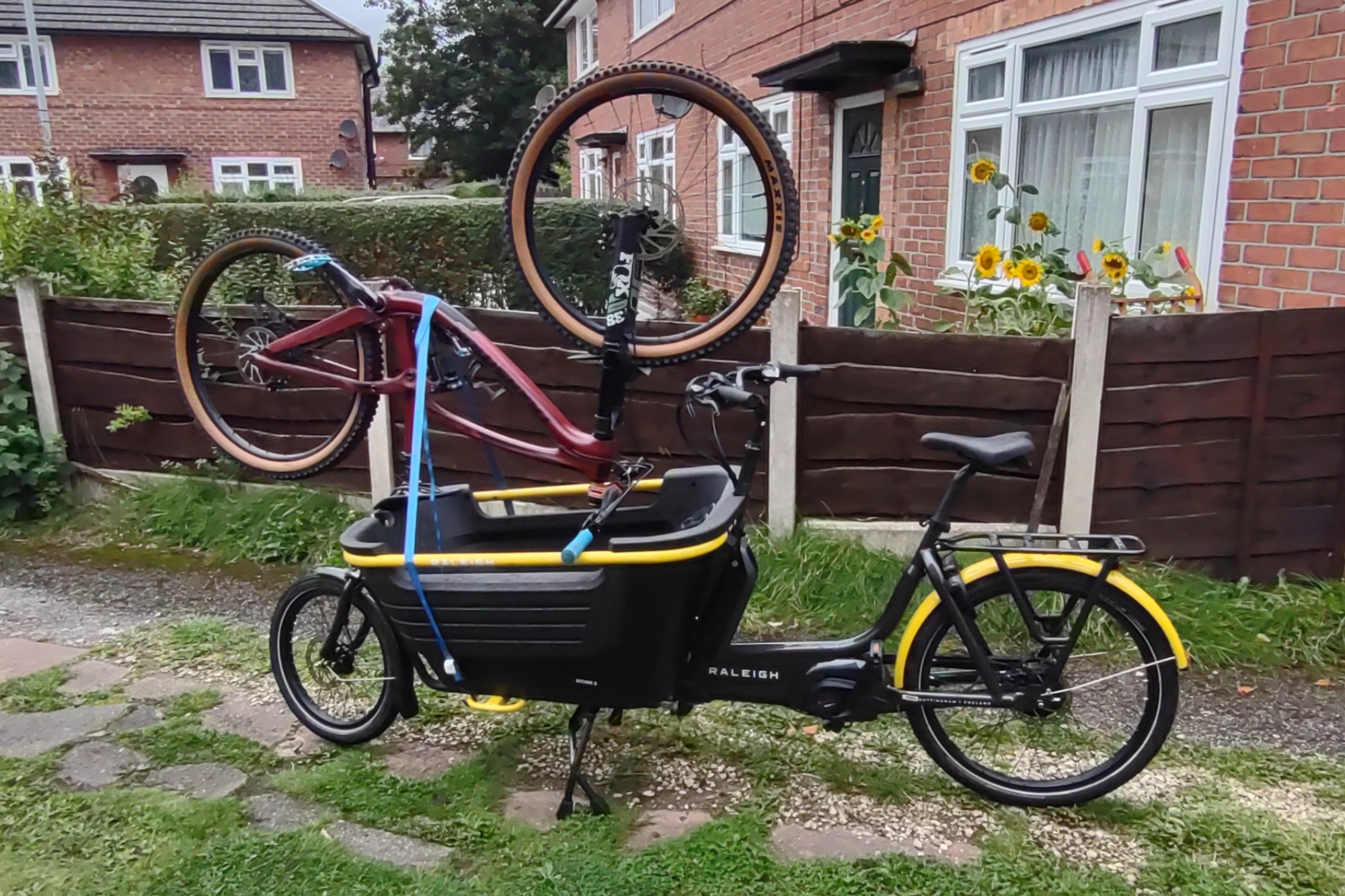
Two bikes, one rider. No problem with the Raleigh Stride 2 e-cargo bike!
Raleigh Stride 2 eCargo Bike - Power and performance
Without doubt, all three users loved the Bosch Cargo Line battery and motor. None of us found the motor wanting for torque, even with the heaviest of loads on the steepest of hills.
Teaming it with the NuVinci Stepless Shifter is a total game changer for electric cargo bikes. I've previously had to dispatch my disgruntled cargo when realising I've come to a stop with far too much reliance on power assist, only to realise that I just can't get a fully cargo bike going again in the same gear.
The ability to change gear when stationary and a motor that's quick to kick in is simply brilliant, doing away with the fear of hill starts in traffic.
Once on the hills, all riders found this to be another area where the stepless shifter excelled. Replacing the conventional ‘stepped’ gearing, the constantly variable transmission box was the perfect solution for all.
The tiny increments made a difference to the comfort of the ride. In stepped gears, you can often find yourself forever changing gear, getting a boost of electrical assistance, changing again, and finding yourself going back and forth between gears; with the stepless system, you can make the smallest of adjustments to your gearing and have a nice balance of electrical assist and leg power. This also helps to conserve battery life.
I think all riders spent a lot of time in the Turbo setting due to either heavy loads or hilly terrains. This of course does limit the Raleigh Stride 2 eCargo bike battery range, although our multi-child rider did find that as rule of thumb, he could transport both children on a seven mile round trip once a day and only have to charge up twice a week.
While I was lucky not to suffer the misfortune of running out of juice on the Stride 2 – I had learnt my lesson riding the Tern GSD and that was bad enough – the other two riders did find the end of the bike's range. Carl reports that it actually rides very well without power, but suffice to say it is exceptionally heavy. I advise to err on the side of caution with plugging in as often as you can. The batteries have no memory effect, there's no need to ensure it's completely empty before recharging.
Myles mentioned the issue of a speed wobble, which he easily dealt with by letting his grip on the bars loosen briefly. Myself and Carl didn't come across this, but I did pick up the issue with Raleigh Head of Brands, Andrew Deacon, who confirmed my suspicions that this would have been down to set up.
"Due to the stretched geometry and requirement of steering linkage components, all 2 wheeled cargo bikes can suffer speed wobble IF something isn’t set up quite right" says Deacon.
"Wheel alignments (and trueness) is key, as well as cargo weight distribution. More commonly, if there is play in any of the steering components, such as the headset, ball joints and steering rods, this could allow speed wobble to occur".
It seems that something wasn't quite perfect with the bike Myles rode, and does confirm that if you are getting speed wobble, don't suffer in silence, get it checked out and it can more than likely be sorted.
Raleigh Stride 2 eCargo Bike - Practicalities
All riders found the Raleigh Stride 2 eCargo bike easy enough to ride after a little practice. The challenge comes from not having the front wheel in line of sight, so it can be easy to get a little disorientated. For me personally, I needed a few rides of empty car parks before entertaining the distraction and weight of a passenger.
This was probably exacerbated by the fact that I was struggling to be simultaneously on the saddle and have a foot securely planting on the ground when stationary. Knowing that every stopping moment needed pre-planned weight shifting probably made my rides more apprehensive than most. It was something I got used to, but something that riders shorter than my 5ft6" (170cm) self would need to think about.
The bike comes with a few incredibly helpful features. As with the Tern GSD, the Raleigh Stride 2 has an integrated lock, automatic front and rear lights and full mudguards. All can be too easily forgotten as separate accessories, turning a nice ride into a highly stressful one. Not having to worry about them is a real bonus.
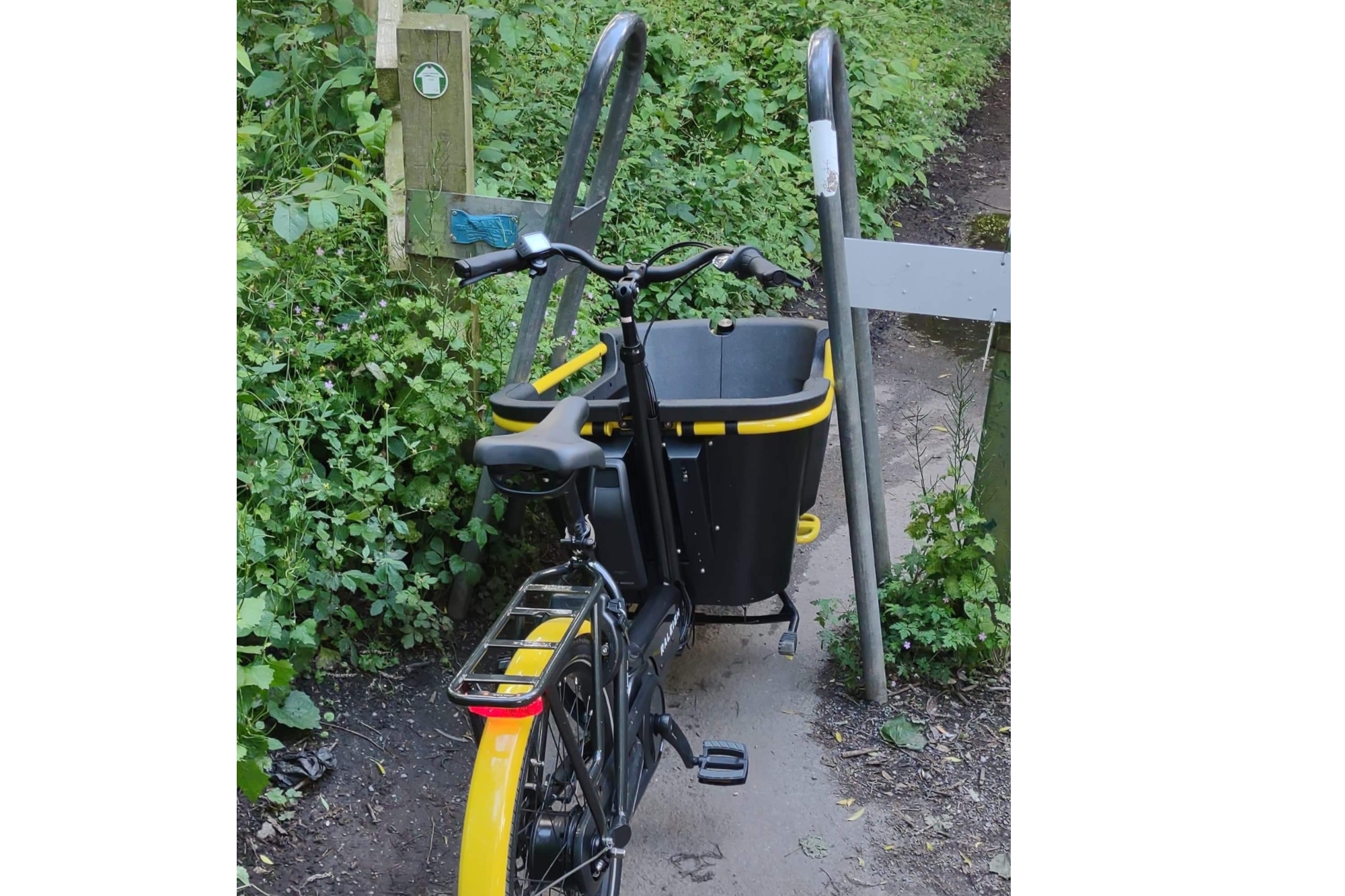
The Raleigh Stride 2 was frustratingly limited by council installed pinch points on bike paths.
Due to the size of the Stride, the unspoken elephant cargo bike in the room are the practicalities of where you ride it, and when your not riding it, where on earth do you keep it?
For two of us living in and around Greater Manchester, the Raleigh Stride 2 eCargo bike use was severely hindered by the pesky traffic control pinch points located ad hoc along bike routes and canal tow paths. It made riding on traffic free routes, which is one of the main reasons for buying a e-cargo bike, impossible.
I could write chapter and verse on the inadequacy and inaccessibility of cycling infrastructure in the UK, and it's not an issue to be levelled at the bike. However, it's something that needs considering. If you are hoping to ditch the road network, you'll find the alternatives infuriately unfit for purpose.
The other big consideration is when you're not actually riding the bike. All of us reviewing the bike are fortunate enough to own somewhere to securely store and recharge the bike. However, at around the same length as a small car, this realistically is a privilege that most people aren't going to have access too. The battery can be removed and charged inside, but that still leaves the 'where do you keep it' question.
Raleigh Stride 2 eCargo Bike - Value
The design, construction and set up makes it easy to fall in love with the Raleigh Stride 2 eCargo bike, and it genuinely is a realistic car alternative for many households. It challenges the concept of an electric cargo bike just being for town or families; indeed it proves both beliefs are unfounded.
This means that the asking price, while seemingly steep, is a much more viable option for many if it means doing away with paying for and running a car.
The bike does have its limitations however, and the storage and access issues aren't to be sniffed at. If these aren't considerations for you, then the bike will be a no brainer. If, however, you're not sure where to keep the bike, or don't like the idea of being on the road, you might find the value not as good as you had hoped.
Raleigh Stride 2 eCargo Bike - Specs
- Frame and fork: High Tensile Steel
- Drive train: Enviolo Stepless Manual Shifting, KMC single speed
- Brakes: Magura MT-C Disc Brakes 160mm
- Wheels: Aluminium 20" front, 26" rear with hub gear
- Tyres: 20"x55 front, 26"x 55 rear Schwalbe pick up
- Bar/Stem: Aluminium
- Saddle: Selle Royal Orbis Zonder
- Weight: 60kilos/ 132lbs (claimed)
- Size: One size
- Cargo capacity: 180kg/ 396lbs Max gross capacity

Thank you for reading 20 articles this month* Join now for unlimited access
Enjoy your first month for just £1 / $1 / €1
*Read 5 free articles per month without a subscription

Join now for unlimited access
Try first month for just £1 / $1 / €1
Get The Leadout Newsletter
The latest race content, interviews, features, reviews and expert buying guides, direct to your inbox!
Hannah is Cycling Weekly’s longest-serving tech writer, having started with the magazine back in 2011. She has covered all things technical for both print and digital over multiple seasons representing CW at spring Classics, and Grand Tours and all races in between.
Hannah was a successful road and track racer herself, competing in UCI races all over Europe as well as in China, Pakistan and New Zealand.
For fun, she's ridden LEJOG unaided, a lap of Majorca in a day, won a 24-hour mountain bike race and tackled famous mountain passes in the French Alps, Pyrenees, Dolomites and Himalayas.
She lives just outside the Peak District National Park near Manchester UK with her partner, daughter and a small but beautifully formed bike collection.
-
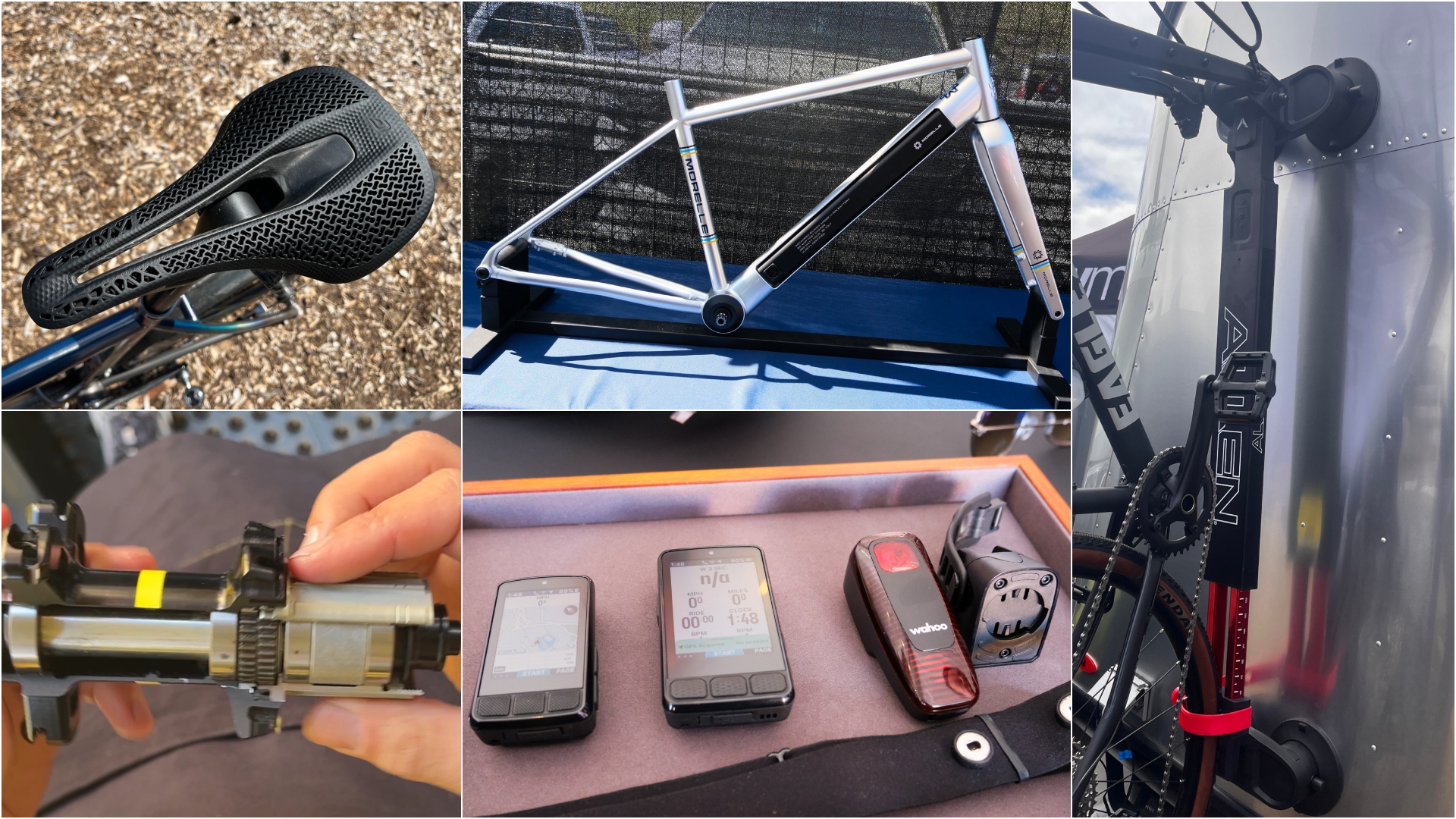 A bike rack with an app? Wahoo’s latest, and a hub silencer – Sea Otter Classic tech highlights, Part 2
A bike rack with an app? Wahoo’s latest, and a hub silencer – Sea Otter Classic tech highlights, Part 2A few standout pieces of gear from North America's biggest bike gathering
By Anne-Marije Rook Published
-
 Cycling's riders need more protection from mindless 'fans' at races to avoid another Mathieu van der Poel Paris-Roubaix bottle incident
Cycling's riders need more protection from mindless 'fans' at races to avoid another Mathieu van der Poel Paris-Roubaix bottle incidentCycling's authorities must do everything within their power to prevent spectators from assaulting riders
By Tom Thewlis Published
-
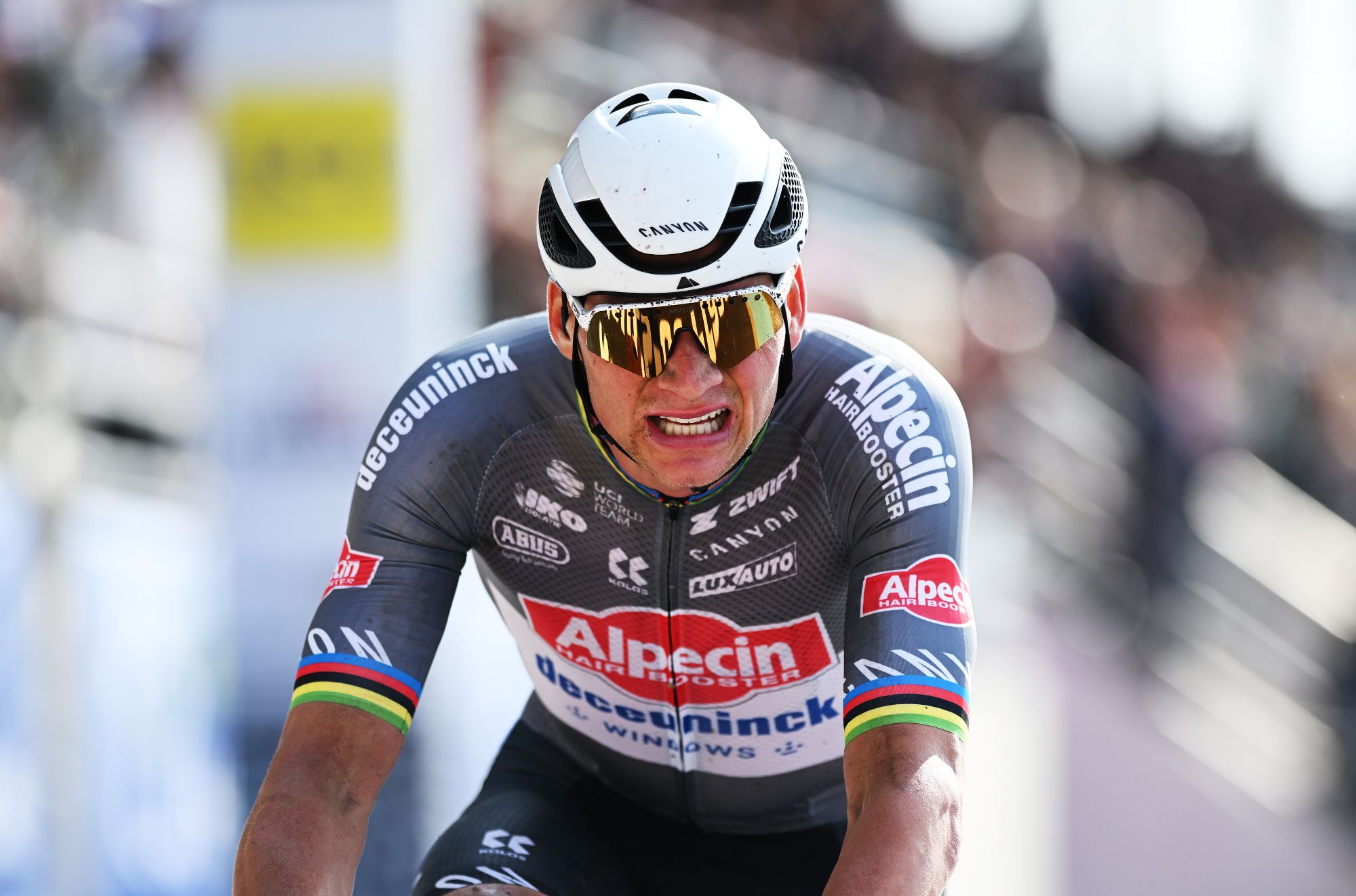 Man hands himself in to Belgian police after throwing full water bottle at Mathieu van der Poel during Paris-Roubaix
Man hands himself in to Belgian police after throwing full water bottle at Mathieu van der Poel during Paris-Roubaix30-year-old was on Templeuve-en-Pévèle cobbled sector when television pictures showed the bottle hitting him in the face
By Tom Thewlis Published